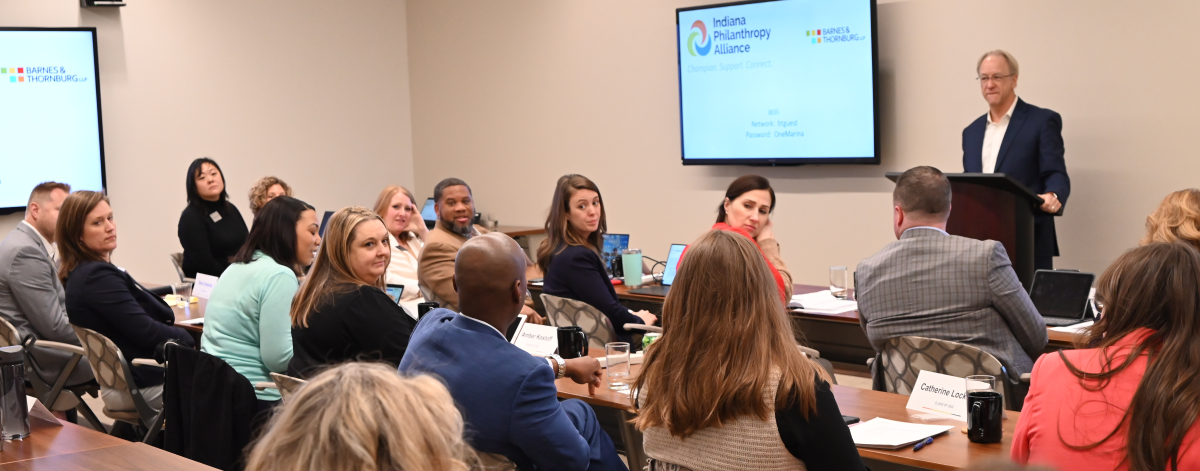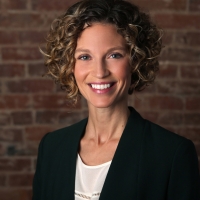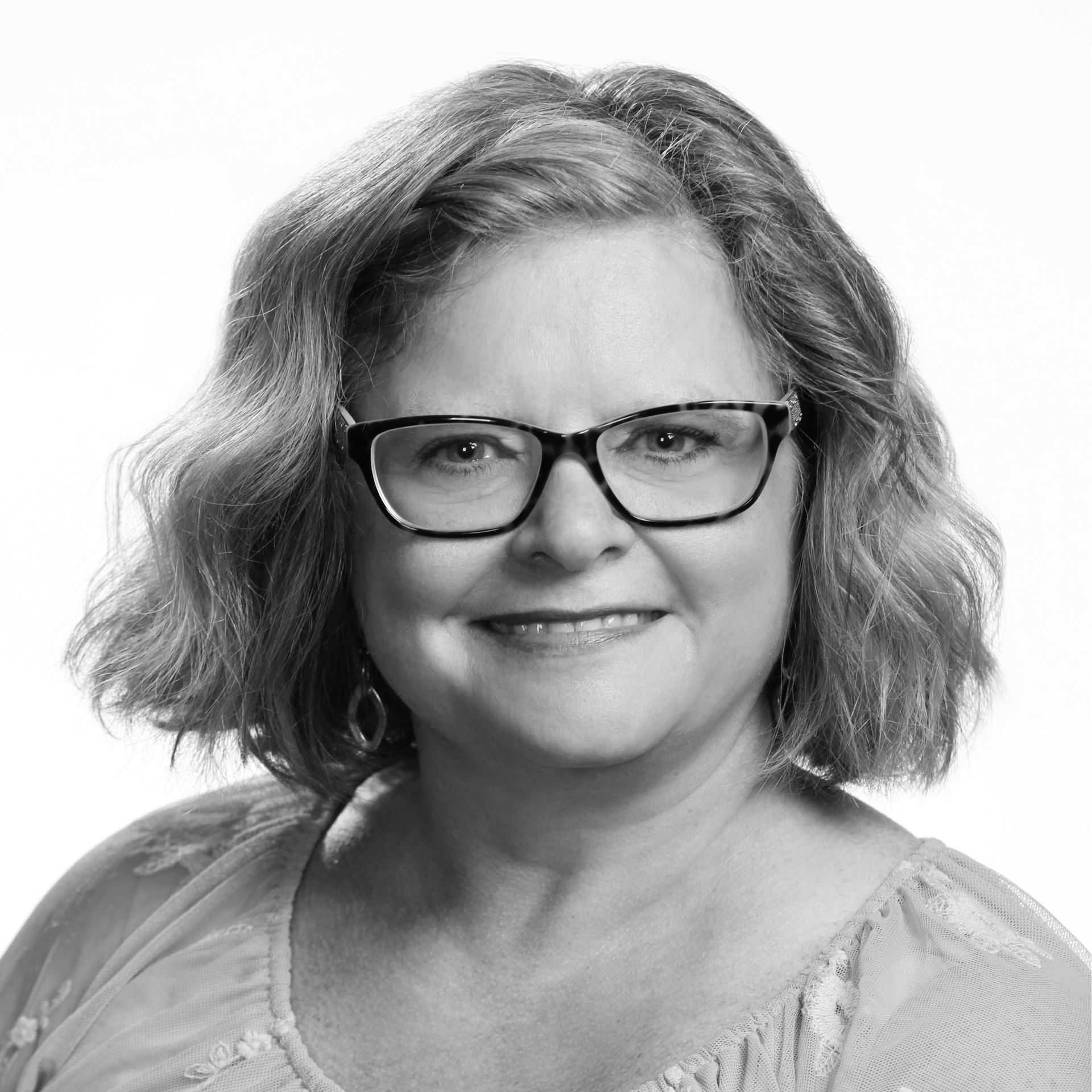Mutz Institute Tackles Bold Ideas for Leading with Impact

The fourth session of the Mutz Philanthropic Leadership Institute (but first time in-person) was charged with energy fueled by impassioned speakers, thoughtful discussions, and jubilant camaraderie. The class title, “Making an Impact,” was demonstrated not only in the presenters’ topics but also through the connections made and stories shared among class participants. Themes of empowered leadership, collaboration, and continuous learning were woven throughout the day.
Small-group discussions started the morning, giving attendees the chance to deeply engage on topics such as reimagining grantmaking, welcoming community initiatives, multi-year funding strategies, and an exploration of development. Class members discussed the idea that effective philanthropic leaders must keep their eyes and ears trained on the communities they serve.
This concept was further highlighted in a conversation with Brian Payne, president and CEO of the Central Indiana Community Foundation (CICF). He spoke about CICF's very deliberate and forthright mission to dismantle racial inequity and systemic racism, both in Indianapolis and around the country. “Equity unleashes everything,” Payne said. By becoming more mindful of equity and letting our communities drive our words and actions, we can begin to nurture the strengths of everyone—instead of just some. “The goal is to take organizations from dependence to independence to interdependence,” Payne said.
Several other speakers joined the class throughout the day, all providing examples of ways their organizations have responded to community needs.
Lending a Hand with Alternative Financing
Dawn Brown, president and CEO of the Community Foundation of Grant County, shared an inspirational story of the foundation’s quest to create an alternative funding source for people who rely on high-interest payday loans. After learning of the predatory nature of payday loan businesses, with some charging 391% interest plus fees to financially vulnerable individuals, the foundation partnered with a local lender, Afena Federal Credit Union—certified as a Community Development Financial Institution (CDFI)—to create the Bridge the Gap Loan Program. “We wanted as many people to know that there is an alternative,” Brown said.
The alternative: An average loan interest rate of 6.79% on reasonable payment terms. After only three months, in December 2020, the program had provided 46 loans, totaling $110,000. The program utilizes an impact investing strategy which has both a social and a financial return for the foundation, making it a win for the foundation, the community, and individuals who benefit from the small loans offered through the program. “Emergencies happen,” Brown said. “When they happen, they shouldn’t have to go to the local loan shark to get their emergency solved.”
With a recent report showing the growing trend of rural communities increasingly turning to predatory lenders due to lack of bank access, this program could be a model for others in their areas.
“Emergencies happen,” shared Brown. “When they happen, they shouldn’t have to go to the local loan shark to get their emergency solved.”
Leading Through Trust
Ruthie Purcell Jones, executive director of the Arthur Dean Family Foundation, shared her efforts to “do philanthropy differently” through trust-based philanthropy, ensuring the foundation serves as a partner to nonprofits by supporting its needs, listening to its feedback, and working hand-in-hand to support youth and families. “We aim for shared power within all relationships within our sphere,” she said. “We need to walk alongside them, learn with them, honor and support them in a way to help them do their job better. We’re no different from a literal bank if we’re not walking beside grantees.”
Purcell Jones implemented elements of trust-based philanthropy, such as simplifying paperwork, being transparent and responsive, and supporting beyond the check, to ensure her grantees can focus less on reporting and compliance and more on meeting constituent needs.
“We see our grantees as partners,” Purcell Jones said. “It’s more labor intensive for us, but we want to offer support beyond just a check.”
Corporate Engagement
Gretchen Gutman, vice president of public policy for Cook Group, highlighted the many ways it has adopted the adage “philanthropy is good business.” Serving both its communities and employees, Cook Group has made intentional investments in educational attainment, skill development, housing, and economic revitalization to improve opportunities for their workforce now and in the future.
Theresa Rhodes, outgoing executive director of the Buckingham Foundation, joined the class as one of her last acts before retirement on April 29. She reflected on the foundation’s hands-on approach to giving, a culture of generosity that starts at the top with Buckingham’s leaders. Whether through matching campaigns, VTO (volunteer time-off), or Days of Service, the Buckingham Foundation strives to be nimble, flexible, and responsive to ever-changing community needs.
Measuring Our Impact
Along with philanthropic grantmaking comes the opportunity to continuous learning through our investment in grantees by conducting formative evaluations using qualitative and quantitative data. Jackie Dowd, vice president for evaluation and special initiatives at Lilly Endowment Inc., closed our day by sharing her thoughts, ideas, and best practices for evaluation.
She encouraged Mutz participants to provide clear evaluation expectations, be consistent with use of evaluation terminology, and ask probing questions that allow both the grantor and the grantee the opportunity to learn. Dowd also urged them to look at all kinds of data.
“Too much focus on quantitative data isn’t always great,” Dowd said. “You need to weigh it with the qualitative.”
The capstone on a wonderful day of connection, learning, and inspiration was a class dinner with a thought-provoking message from the man himself, John Mutz.
Learn about the Mutz Philanthropic Leadership Institute class of 2022.




